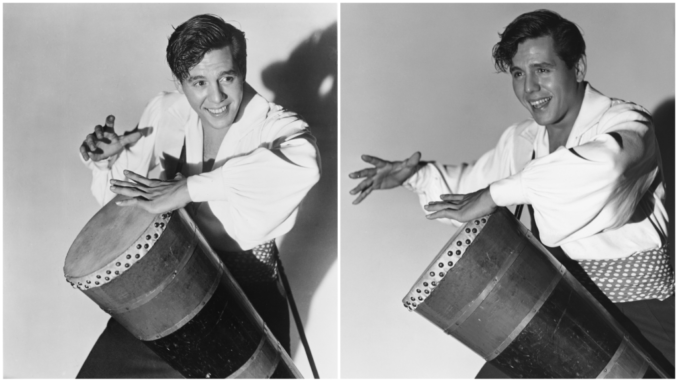
Years before he played the charming and devoted husband Ricky Ricardo on the sitcom “I Love Lucy” and became a bandleader who belted out “Babalú” before audiences, Desi Arnaz was a teenage Cuban immigrant who struggled to learn English in Florida.
He attended a Catholic school in Miami Beach, picking up the guitar and the conga drum. And he was eventually hired as a bandleader at a nightclub where he popularized the conga.
Nearly 90 years after that first big break, Miami Beach honored him Tuesday with a historical marker that was placed near where the nightclub stood. The marker pays tribute to his younger years in the city and celebrates him for paving the way for generations of Latino entertainers.
“He was not only a pioneer for Cubans that were coming to the United States but he was a pioneer for the arts in Miami Beach,” said Alex Fernandez, a member of the Miami Beach Commission, the city’s legislative body.
Desi, ‘an American Original’
The new marker is at Collins Park outside the Miami City Ballet. It is near the site of the former Park Avenue Restaurant that hosted performances and came to be remembered as the Park Avenue nightclub. The memorial joins an artsy Miami Beach district that includes the Bass Museum of Art and a library.
The idea for the tribute came from Gary McKechnie, an author, speaker and fan of Arnaz.
At book lectures, McKechnie often presented a 1954 clip from a TV tribute to Arnaz and Lucille Ball, his colleague and wife, in which Arnaz thanked America for opportunities.
At the gala in their honor, Arnaz reminisced about his journey from Cuba to Hollywood, from a penniless immigrant who had cleaned canary cages to make money to a celebrity on the American stage.
“I don’t think there’s any other country in the world that can give you that opportunity,” he said.
McKechnie said of the clip, “It really impacted me and it still does.”
During the pandemic, he also reread Arnaz’s 1976 autobiography, “A Book.”
When McKechnie was reminded of the entertainer’s early years, he wondered about his legacy: “Why isn’t there a tribute to him — especially one down in Miami?”
Two stars celebrate Arnaz’s fame on the Hollywood Walk of Fame in Los Angeles, but those “don’t tell his story,” McKechnie said. A marker in the entertainer’s American hometown, he thought, might be a good way to honor him.
McKechnie sent proposals for a marker to the Florida Historical Marker Program and the Miami Beach City Council, which were approved. The new historical marker consists of a plaque that calls Arnaz “an American original” and tells some of his story as part of a wave of Cuban émigrés who fled the Cuban Revolution of 1933 that deposed President Gerardo Machado.
The marker’s unveiling coincided with the last day of Hispanic Heritage Month, and with the date of the 1951 premiere of “I Love Lucy,” the show that would make Lucy and Desi household names.
Their story has also been the subject of documentaries and movies, including the 2021 film “Being the Ricardos,” starring Nicole Kidman and Javier Bardem, which centered on one very bad week on the sitcom and how they navigated relationship troubles. The 2022 documentary “Lucy and Desi” explored their career and romance, a collaboration that would make waves in Hollywood.
Starting a Conga Line
Desiderio Alberto Arnaz y de Acha was born in Santiago de Cuba on March 2, 1917, to a wealthy family. His father was the city’s mayor, but after the Cuban Revolution the family fled to Miami.
As a teenager, Arnaz lived in a pest-ridden warehouse, cleaned canary cages for 25 cents each and laid tile for money, according to biographic data issued for the unveiling by the city of Miami Beach.
At St. Patrick Catholic School in Miami Beach, he learned English and emerged as a budding musician, according to a yearbook from 1937. “He possesses a splendid voice, and every now and then he lends it to the choir,” the book stated.
After high school, his first gig was singing and playing guitar in the Siboney Septet, a rumba band. He also performed at parties, at graduations and at the Roney Plaza Hotel in Miami Beach.
In 1937, he was booked to perform at the Park Avenue nightclub with a band that was unfamiliar to him. “It was quickly apparent Desi’s pickup musicians couldn’t play the Latin rhythms Arnaz had promised,” according to the Miami Design Preservation League, which hosted a lecture about him by McKechnie.
To save the show, Arnaz tapped a simple rhythm — “One, Two, Three, Kick!” — played at parties in Cuba. He quickly taught it to the band, and his upbeat conga performances were born, Arnaz wrote.
He led the audience out of the club, and people danced into the nearby streets, according to the marker. The club was later renamed La Conga.
The ‘I’ in ‘I Love Lucy’
“His endless talent and determination led him to Broadway and then Hollywood where he met the love of his life, Lucille Ball,” the new marker reads.
Arnaz and Ball starred in “I Love Lucy” for 180 episodes over six years. He was credited for having the show filmed with a three-camera technique that revolutionized the filming of sitcoms.
The couple built the TV empire Desilu Productions — which backed such hit series as “Star Trek” and “Mission: Impossible” — and they owned RKO Radio Pictures, a movie production company. Arnaz died in 1986 at age 69.
Comments from the 1954 gala are inscribed on the plaque. Arnaz concluded by expressing appreciation for Ball and addressing the country that gave him a home and a place to thrive. “I want to say thank you — thank you, America.”
